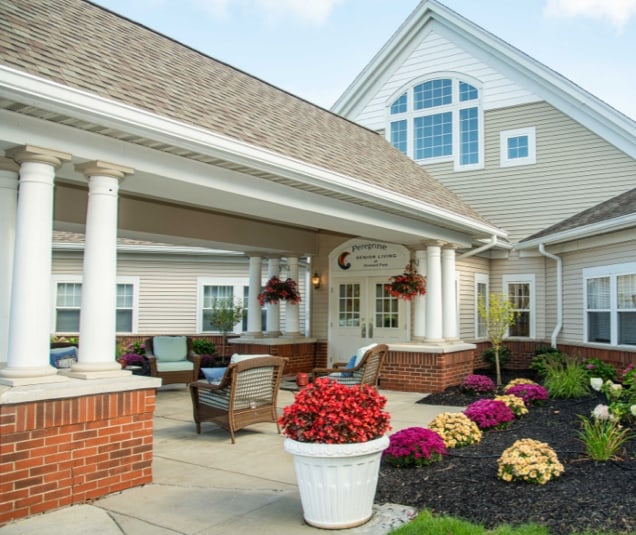Cognitive impairment and memory loss are common problems linked to the aging process. However, these concerns can often worsen, creating new, unique challenges for everyday life.
When a loved one needs professional support due to memory impairment, senior living can help.
Senior living communities offer targeted memory care services. These can provide emotional, cognitive, and physical support to those living with cognitive impairment.
With a team of professional caregivers, these communities offer an excellent way to help slow decline and preserve a person’s quality of life.
What Is Memory Care?
Memory care is a specialized type of senior care. It’s not like other communities—memory care is specifically targeted to treat conditions like dementia, Alzheimer’s disease, and other common types of memory-related challenges.
Memory care communities provide quality care in a home-like setting to help preserve a person’s quality of life. When mild cognitive impairment (MCI) is noticeable, memory care can help.
These communities create personalized programs and activities to help keep your loved one engaged. These programs don’t just manage symptoms—they can strengthen the mind and often slow cognitive decline.
Who Is Memory Care For?
Memory care evolved from a need for tailored care that addresses the unique challenges of complex memory conditions with compassion and understanding.
Cognitive impairment impacts everyone differently. Memory care caregivers understand these unique challenges and provide tailored support with deep empathy.
Whether the cognitive changes are significant or minor, memory care offers a personalized approach to help seniors live engaged, comfortable lives.
It’s particularly ideal for seniors who:
- Have been diagnosed with Alzheimer’s disease, dementia, or other conditions
- Struggle with daily tasks such as grooming, cooking, or managing medication
- Experience confusion, disorientation, or challenges with short-term or long-term memory
- Require a secure environment to prevent wandering or promote safety
- Could benefit from structured activities tailored to memory support
If your loved one’s MCI is impairing their everyday life, memory care can help. Even if the changes are minor, memory care can preserve quality of life and often prevent further decline.
How Memory Care Helps Seniors With MCI
Memory care isn’t just about addressing memory, though. It’s also about helping improve everyday quality of life. These communities apply several strategies designed to support cognitive health and well-being.
Structured Daily Routines
Consistency is key when it comes to MCI. It’s about reducing stress and anxiety and restoring predictability to your loved one’s day. That’s why these communities plan out every day well in advance and work to keep things structured.
Typically, memory care provides:
- Morning exercise classes that encourage movement & energy
- Midday activities like crafting, gardening, or music therapy to engage creativity
- Evenings spent in quiet, social environments to foster connection & unwind
Structured routines make it easier to adjust to day-to-day life.
Cognitive & Emotional Stimulation
Programs for seniors with MCI engage the mind. The activities and interactions help bring cognitive training to everyday life to strengthen your loved one’s cognitive skills.
These programs may include:
- Memory games & puzzles to sharpen problem-solving abilities
- Storytelling or reading sessions to stimulate imagination & retention
- Group discussions & interactive activities to encourage social engagement
- Brain-training apps or computer exercises tailored for cognitive enhancement
- Personalized activities focused on hobbies & interests to evoke positive memories
These can often help slow symptom progression and bring joy to everyday life.

Safe & Supportive Environments
Cognitive impairment can be problematic for both mental and physical wellness. It often causes wandering, and if your loved one experiences short-term memory problems, this can lead to them getting lost.
Cognitive decline can even put a person at risk and compromise their ability to recognize hazards.
That’s why memory care offers:
- Secure spaces designed to prevent wandering & minimize risks
- Staff trained to provide specialized care & 24/7 supervision
- Assistance with daily activities in a structured & supportive environment
- Personalized care plans tailored to individual needs & preferences
- Engagement in therapeutic activities aimed at maintaining cognitive function
The combination of security and flexibility supports your loved one’s safety every day. Reliable care can also restore peace of mind to your entire family.
When to Consider a Move to Memory Care
Cognitive decline is often extremely complex. It’s rarely recognizable in the earliest stages, and sometimes, it could even be mistaken for age-related forgetfulness. However, some signs stand out that your loved one’s cognitive state is changing.
Some early signs it’s time for memory care include:
- Increasing difficulty with daily tasks, like cooking or managing finances
- Frequent confusion or disorientation, even in familiar environments
- Wandering or getting lost in unsafe areas
- Significant changes in mood, behavior, or personality
- Forgetting important information, including the names of family members
These signs all indicate it’s time for a change. An early move to memory care is a chance to intervene sooner rather than later, providing the support your loved one needs to help preserve their cognitive abilities.
Making the Early Transition to Memory Care
Memory care can make a big difference in your loved one’s daily life.
With the help of an experienced community like ours, you can step in before your loved one’s cognitive condition worsens. You can trust our incredible team to tailor programs and activities for your loved one every day.
We’re always happy to help older adults in need at Peregrine Senior Living at Orchard Park. In our community, your loved one can enjoy a lifestyle with engaging activities supported by a compassionate team. Schedule a visit to learn more about memory care in Orchard Park.












Drumming sessions led by Ken are invariably a success. Great way to start our Monday morning effectively. ... See MoreSee Less
3 CommentsComment on Facebook
March has arrived, hopefully bringing warmer weather. ... See MoreSee Less
0 CommentsComment on Facebook
I was honored to celebrate the achievements of an outstanding resident today; gratitude is expressed to Barb's family and friends for making it a memorable celebration. Thanks to Gary for his special contribution  ... See MoreSee Less
1 CommentsComment on Facebook
Dining at our community is about more than what’s on the plate—it’s about connection, community, and the joy of gathering together.
Our talented culinary team crafts meals that are both delicious and nutritious, offering flavors that comfort and inspire.
From themed dinners to chef demonstrations, each meal becomes an opportunity to savor the moment and celebrate life’s simple pleasures. 🍴
peregrineorchardpark.com/ ... See MoreSee Less
2 CommentsComment on Facebook
Easter Egg Hunt at Peregrine Orchard ParkMar 28, 11:30am101 Sterling Drive, Orchard Park, NY, United States, New York 14127Join us for an Easter Egg Hunt at Peregrine Orchard Park! March 28th at 11:30am, the Easter Bunny will be stopping by for an egg hunt! The hunt will be outside, rain or shine, so bring your boots, coats, and baskets! All are welcome to come! For questions, call 716-675-1022 and ask for Allison or Liz!
... See MoreSee Less
0 CommentsComment on Facebook
Today, we celebrated one of our colleagues who successfully passed her nursing board exams and earned her RN designation; we are extremely pleased to see what her future endeavors will bring. ... See MoreSee Less
14 CommentsComment on Facebook
Today we celebrate the caregivers—those whose quiet strength and unwavering compassion bring comfort to so many.
We see the difference caregivers make every day: holding a hand, sharing a smile, or offering reassurance when it’s needed most. 💕
Your dedication reminds us that true care goes beyond tasks—it’s an act of love, patience, and humanity.
Thank you for all you do to make the world a more compassionate place.
peregrineorchardpark.com/ ... See MoreSee Less
1 CommentsComment on Facebook